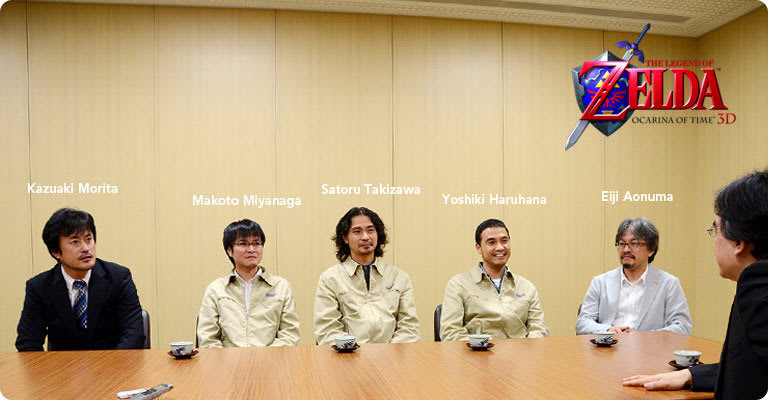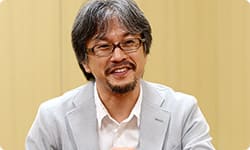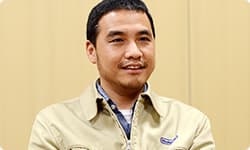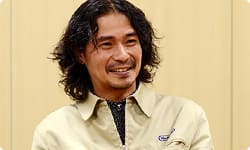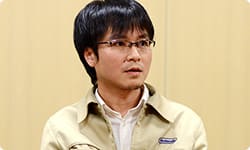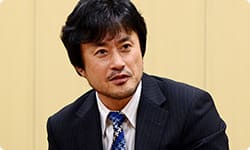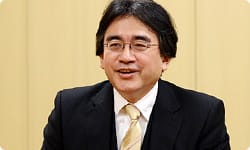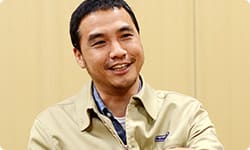Fun Days
Thank you for coming today.
We're pleased to be here.
Aonuma-san, who participated in our last session of "Iwata Asks,"is staying on as we begin part two of our series featuring the original development staff that worked on the Nintendo 64 version of The Legend of Zelda: Ocarina of Time. Part one was like a class reunion! (laughs)
Yeah. I'm sure we'll have fun this time, too! (laughs)
What did each of you work on for the original game? Haruhana-san, would you introduce yourself first, please?
I'm Haruhana from the Entertainment Analysis & Development Division (EAD). I did most of the modeling and animation myself for characters other than Link, whom (Yoshiaki) Koizumi-san was in charge of.
That was before the work was divided up so much, so you had to do everything yourself.
Yes. It was really fun, because you had control over everything yourself.
I'm Takizawa from EAD. Haruhana-san made the characters, but I was in charge of the bosses and enemies. I had the honor of learning under Morita-san at SRD1 in creating their movements. Each day, I enjoyed breathing life into the bosses I had designed. 1. SRD Co., Ltd.: A company established in 1979 that contracts to develop video game software programs and develops and sells CAD packages. The head office is in Osaka, and their Kyoto office is inside Nintendo headquarters.
I'm Miyanaga from EAD. I was in charge of field design. Lots of fields appear in this game. I was in charge of Kokiri Forest—the first stage—as well as Hyrule Field and other locations.
I'm Morita from SRD. As Takizawa-san mentioned, I was mainly in charge of programming the bosses. I also worked on the fishing minigame.
No, no… (laughs)
You didn't just do the programming, but you also wrote the script for the Pond Owner who appears at the Fishing Pond.
Oh, that's right! He speaks in the Osaka dialect, so I wrote sample dialogue and gave it to (Toru) Osawa-san, the script director, to brush up.
In addition to the dialogue, Morita-san made lots of requests regarding that character's face and movements. He requested specific movements like this one (gesturing as if scratching his side) and even drew a rough sketch of how his face should look.
Yeah. (laughs)
Earlier, I said that it was fun having complete control over the characters, but when it came to that character, I had no control! (laughs)
(laughs)
Morita-san, did you make so many requests because that character was modeled after someone real?
Yes, that's right! (laughs) I like fishing and I'm from an area near Neyagawa in Osaka, and there's a fishing store I used to go to in that neighborhood. My model was the shopkeeper there.
I knew it.
You caught me. (laughs)
Morita-san made so many requests that we had to redo the character at least two or three times. (laughs)
(laughs)
Later on, I'd like to talk to you more about the Fishing Pond.
Okay. (laughs) I'll be looking forward to it.
Haruhana-san, Takizawa-san and Miyanaga-san, you were the core designers for The Legend of Zelda: Ocarina of Time, but you were all quite young at the time.
Yes.
Before that, what kind of work were you doing, Haruhana-san?
In the days of the Nintendo 64 system, I designed the map for Super Mario 64.2 After that, I designed and supervised the UI (user interface) and demos for Star Fox 64.3
2. Super Mario 64™: The first 3D action game in the Super Mario Bros.™ series. Released simultaneously with the Nintendo 64™ system in June 1996.
3. Star Fox™ 64: A 3D shooting game released for the Nintendo 64 system in April 1997.
How many years have you been at the company?
This is my eighteenth year. I joined in 1994.
And did you work with the Nintendo 64 system right after joining?
No, at first I received guidance from (Yoichi) Kotabe-san4 and did artwork. My first real assignment was doing illustrations for Kirby's Dream Course.5
Huh? Kirby's Dream Course?
Yes.
You did that?!
Uh, yeah. That's right. (laughs)
Hmm, I didn't know that. Thank you for your work on that.
No, not at all! (laughs)
Kirby's Dream Course came out in September of 1994, right after you joined the company.
Yes. After that, I drew illustrations for Super Mario World 2: Yoshi's Island.6 I was involved with artwork, but when we were switching from the Super Famicom system to the Nintendo 64 system, I gradually started helping make the games. After development of Super Mario 64 began, I started working on field design.
Lots of people were brought in to help with the field design for that game.
Yeah. Miyanaga-san, too, right?
Yeah.
4. Mr. Yoichi Kotabe: One of Japan's foremost animators. His works include the popular anime series Heidi, Girl of the Alps. Later, he joined Nintendo, where he began designing characters such as Mario™. Currently he is active as a freelance agent.
5. Kirby's Dream Course™: An action game released for the Super Famicom system in September 1994. At the time of release, Satoru Iwata was president of HAL Laboratory, Inc., which developed the game.
6. Super Mario World™ 2: Yoshi's Island™: An action game released for the Super Famicom system in August 1995.
Haruhana-san, when you were placed in charge of character design for The Legend of Zelda: Ocarina of Time, could you see from the start what you had to make?
I'm not sure what you mean.
According to the "class reunion" we had earlier, no one could see the goal toward which they were headed, despite running full steam ahead.
We might chalk that up to youth. (laughs)
(Takumi) Kawagoe-san, who was in charge of the cinematics, said the same thing!
I just remember everyone plunging whole-heartedly ahead.
That's right.
I became able to do new things each day, and new characters rapidly came to life, so coming to work every day was a blast.
The Nintendo 64 system was still new, so lots of graphics like we'd never seen before appeared. Each day was a fresh experience.
Yes. Iwata-san mentioned not being able to see the goal, but it was more like I didn't even think about the goal! I just innocently focused on my drawing.
Yes, we worked innocently.
That's how fun every day was!
